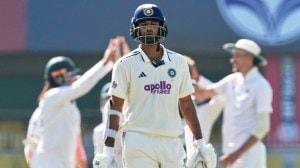Rocca on her way back to Delhi, Iraq on the talks table
The regional big picture — from the Middle East to China via Iraq, Afghanistan and Pakistan — will be on the agenda when Christina...

The regional big picture — from the Middle East to China via Iraq, Afghanistan and Pakistan — will be on the agenda when Christina Rocca, the US pointperson for South Asia, arrives here for talks next week with the Foreign Office.
Rocca’s arrival in the Capital, soon after Israeli Prime Minister Ariel Sharon’s visit to India from September 7-11, is being described as a ‘‘coincidence,’’ despite the growing convergences between New Delhi, Washington and Tel Aviv.
By the middle of the month, Prime Minister Vajpayee leaves for his visit to the UN General Assembly in New York, via Turkey, on the margins of which there is likely to be a meeting with US President George Bush.
While the regional security dialogue between India and the US is an annual exercise, analysts here said it offered both sides more than an opportunity to exchange views. Especially on matters of regional concern — for example, the Maoist violence in Nepal — it allowed ‘‘pretty intensive interaction’’ between the two sides. Undoubtedly, Rocca will be updated about Sharon’s visit to New Delhi-Agra-Mumbai as well as given a readout on New Delhi’s ties with Palestine, partner in the US-sponsored Middle East peace process.
But it’s on Iraq and Afghanistan that both sides are expected to have their most interesting conversations. In Iraq, the escalating violence seems to have persuaded at least parts of the US government, such as Rocca’s boss Richard Armitage, that the US must bring in a new UN Security Council resolution which shares the responsibility for securing Iraq with other nations.
In Afghanistan, meanwhile, the Taliban seem to have regrouped their forces a mere two years after 9/11, with the Western media documenting their ability to cross in and out of Pakistan with considerable ease.
New Delhi is expected to point out that Pakistan also continues to refuse land access to trucks carrying Indian goods for Afghanistan. MEA officials will also update Rocca on General Musharraf’s unwillingness to end cross-border terrorism, despite PM Vajpayee’s offer of talks in the face of repeated violence.
Back in Iraq, even as New Delhi watches Britain take over the presidency of the Security Council today — Washington follows next month — it seems already interested in a US proposal that allows the UN to take command of the security forces in Iraq, with the top general being an American.
Analysts said India could, in principle, serve under such a command since it was ‘‘mandated by the UN.’’



- 01
- 02
- 03
- 04
- 05




























